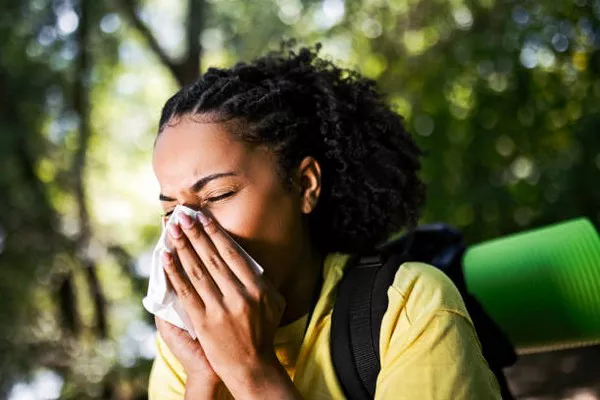As winter bids farewell and the vibrant colors of spring emerge, many individuals eagerly anticipate the warmer weather and blossoming flowers. However, for those prone to allergies, spring brings with it a myriad of airborne allergens that can trigger uncomfortable symptoms. Understanding common spring allergies is essential for effective management and a more enjoyable season.
Types of Common Spring Allergies:
1. Pollen Allergy:
Pollen is a major springtime allergen and is released by trees, grasses, and weeds to fertilize other plants. Trees such as oak, birch, maple, and pine are notorious pollen producers. Grasses like Bermuda, Timothy, and Kentucky Bluegrass, along with various weeds, also contribute to pollen counts.
2. Hay Fever (Allergic Rhinitis):
Often synonymous with pollen allergies, hay fever refers to allergic reactions to airborne particles like pollen or mold spores. Symptoms include sneezing, runny or stuffy nose, itchy or watery eyes, and fatigue.
3. Mold Allergy:
As spring brings warmer temperatures and increased humidity, mold spores become more prevalent. Mold can grow on decaying leaves, in damp areas of the home, and in outdoor environments with decomposing vegetation.
4. Tree Allergy:
Trees release large amounts of pollen during spring, making tree pollen allergies common. Different trees produce allergenic pollen at various times, extending the duration of tree allergies throughout the season.
See Also: 7 Trees That Trigger Hay Fever & Strategies for Management
5. Grass Allergy:
Grass pollen is another significant allergen in spring. Lawns, meadows, and fields can become sources of grass pollen, triggering allergic reactions in susceptible individuals.
6. Weed Allergy:
Weeds such as ragweed, lamb’s quarters, and pigweed release allergenic pollen during spring and fall. Weed pollen allergies can be particularly troublesome for those sensitive to these plants.
Causes of Spring Allergies:
Spring allergies are primarily caused by the immune system’s overreaction to harmless substances, viewing them as threats. When individuals with allergies come into contact with allergens like pollen or mold spores, the immune system releases chemicals, including histamines, leading to allergic symptoms.
The increased presence of airborne allergens in spring is mainly due to the following factors:
1. Blooming Plants:
Trees, flowers, and grasses release pollen to facilitate reproduction. As these plants bloom in spring, the pollen counts in the air rise, triggering allergies.
2. Warmer Temperatures:
Spring’s warmer temperatures contribute to the proliferation of mold spores. Mold thrives in damp conditions, and the combination of warmth and moisture creates an environment conducive to mold growth.
3. Increased Humidity:
Higher humidity levels, common in spring, can encourage the growth of mold both outdoors and indoors. Damp conditions provide an ideal breeding ground for mold spores.
4. Wind Dispersion:
Wind plays a crucial role in dispersing pollen over long distances. This airborne transport facilitates the widespread distribution of allergens, making it challenging for individuals to avoid exposure.
Symptoms of Spring Allergies:
Recognizing the symptoms of spring allergies is essential for early intervention and effective management. Common symptoms include:
1. Sneezing:
Frequent bouts of sneezing are a classic symptom of spring allergies, triggered by the immune system’s response to allergens.
2. Runny or Stuffy Nose:
Allergic reactions can cause nasal congestion or a runny nose, making breathing difficult and uncomfortable.
3. Itchy or Watery Eyes:
Irritation of the eyes, often accompanied by itching, redness, and excessive tearing, is a common allergy symptom.
4. Fatigue:
Allergic reactions can lead to fatigue, as the body expends energy in responding to perceived threats.
5. Coughing and Throat Irritation:
Allergies may contribute to coughing and throat irritation, especially if allergens are inhaled.
6. Headache:
Some individuals may experience headaches as a result of sinus congestion and pressure caused by allergies.
7. Skin Irritation:
Allergies can manifest on the skin, leading to conditions like eczema or hives.
Management Strategies for Spring Allergies:
1. Allergen Avoidance:
Monitor pollen forecasts and try to stay indoors on days with high pollen counts. Keep windows closed during peak pollen seasons and use air purifiers to reduce indoor allergen levels.
2. Regular Cleaning:
Regularly clean living spaces to minimize mold growth. Pay attention to damp areas such as bathrooms and basements.
3. Use of Allergy Medications:
Over-the-counter antihistamines, decongestants, and nasal corticosteroids can provide relief from allergy symptoms. Consult with a healthcare professional for personalized recommendations.
4. Immunotherapy:
Allergy shots or sublingual immunotherapy can be considered for individuals with severe allergies, offering long-term relief by desensitizing the immune system to specific allergens.
5. Eye Drops:
Allergy-specific eye drops can alleviate itching and redness associated with allergic conjunctivitis.
6. Stay Informed:
Keep track of local pollen forecasts and be aware of common allergens in your area. This information can help you plan outdoor activities on days with lower allergen levels.
Conclusion:
Understanding and effectively managing common spring allergies are crucial for individuals seeking to enjoy the beauty of the season without the burden of allergic symptoms. By implementing proactive strategies, staying informed, and seeking appropriate medical advice, individuals can navigate spring with greater comfort and well-being.


